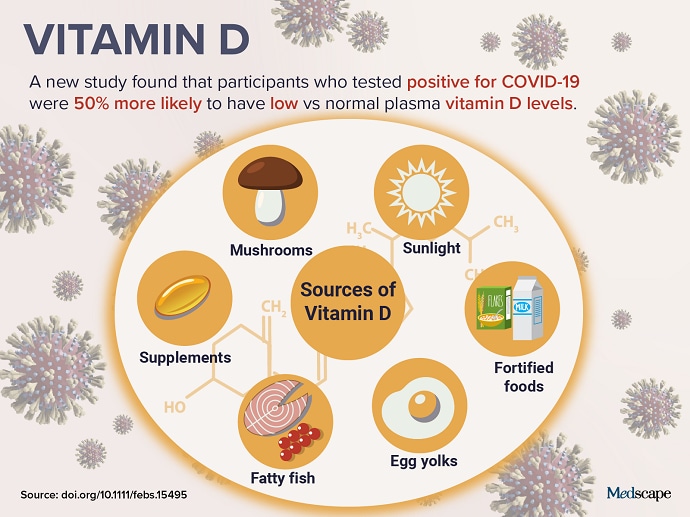Trending Clinical Topic: Vitamin D
No Results
No Results
Each week, we identify one top search term, speculate about what caused its popularity, and provide an infographic on a related condition. If you have thoughts about what’s trending and why, share them with us on Twitter or Facebook. Find the latest COVID-19 news and guidance in Medscape’s Coronavirus Resource Center.
New findings about the role of vitamin D in various conditions, along with recent guidance from medical societies about vitamin D in the era of COVID-19, resulted in this week’s top trending clinical topic.
Results of a study published online in the FEBS Journal showed that low plasma vitamin D levels are an independent risk factor for COVID-19 infection and hospitalization (see Infographic below). The large, population-based study found that a higher proportion of patients who tested positive for COVID-19 had low plasma 25(OH)D concentrations, about 90%, vs 85% of participants who tested negative.
The study also linked low plasma vitamin D levels to an increased likelihood of hospitalization for COVID-19 infection. Researchers say that these findings should prompt physicians to regularly monitor patients’ vitamin D levels, in order to keep them in the optimal range for overall health and to potentially aid in an immune response to COVID-19.
In terms of specific guidance, six medical societies from around the world recently released joint recommendations that emphasize the importance of individuals obtaining the daily recommended dose of vitamin D during the pandemic. The American Society for Bone and Mineral Research, the Endocrine Society, and the American Association of Clinical Endocrinologists, among others, issued “Joint Guidance on Vitamin D in the Era of COVID-19.”
Central to the guidance is the recommendation to directly expose the skin to sunlight for 15-30 minutes per day, while taking care to avoid sunburn. They also noted that supplementation of 400-1000 IU daily may help keep levels in the optimal range, especially as outside activity declines given the continued spread of COVID-19.
Recent studies have also examined the role of vitamin D in other conditions. Research published in the journal Cancer showed that taking vitamin D before starting immune checkpoint inhibitor (ICI) therapy decreased the risk for treatment-related colitis. ICIs can dramatically improve outcomes for certain patients with cancer but can also cause serious inflammatory reactions and immune-related adverse events. The most frequent and severe of these adverse reactions is colitis. Encouragingly, the study found that vitamin D use was linked to a 65% decreased odds of developing ICI colitis.
A separate study out of the United Kingdom found that higher serum vitamin D concentrations are nonlinearly associated with a lower risk for all-cause, cardiovascular disease, and cancer mortality. Findings from more than 365,000 participants suggest that thresholds of 45-60 nmol/L may represent a potential target to reduce the risk for premature death, which needs to be confirmed in future randomized controlled trials.
From its role in COVID-19 to its relationship to other serious conditions, vitamin D remains a key focus of evolving research, which helped it to become this week’s top trending clinical topic.
Take a short quiz about vitamin D supplementation and deficiency.
Medscape © 2020 WebMD, LLC
Any views expressed above are the author’s own and do not necessarily reflect the views of WebMD or Medscape.
Cite this: Ryan Syrek. Trending Clinical Topic: Vitamin D – Medscape – Aug 07, 2020.
Senior Editor, Medical Students, Medscape Drugs & Diseases
Disclosure: Ryan Syrek has disclosed no relevant financial relationships.
You have already selected for My Alerts
Click the topic below to receive emails when new articles are available.
You’ve successfully added to your alerts. You will receive email when new content is published.
processing….
Trending Clinical Topic: Vitamin D
Research & References of Trending Clinical Topic: Vitamin D|A&C Accounting And Tax Services
Source

